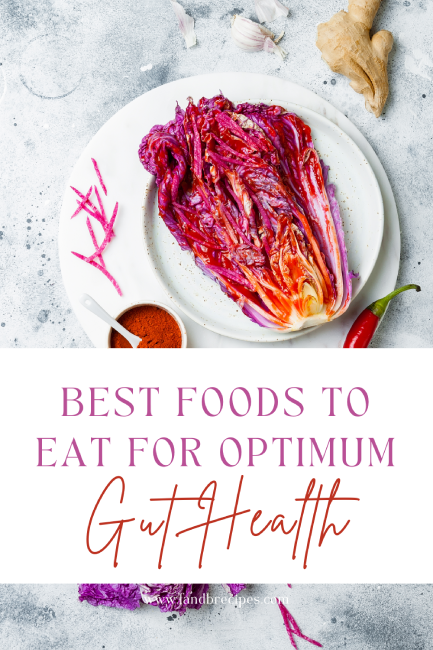Best Foods To Eat For Optimum Gut Health
The link between gut health and overall health is not a new area of study, but in recent years, it has become a topic of intense media and public interest.
The link that has been found between gut health and overall well-being cannot be overlooked, and it seems that having a healthy gut not only helps with better digestion but also has a significant impact on the immune system functioning, the energy level that someone has, a persons mental health, and much more. Indeed, some studies have found that if you have a low level of serotonin in your gut, you are likely to have a low level of it in your brain, too.
So, to support a healthy gut and to help keep the gut flora well balanced, there are many foods that you can add to your diet that can make a lot of difference. In this article, the best foods for gut health will be explored so you can look into which ones may best suit your diet and lifestyle. Enjoy!
Vegetables and Fruits
It goes without saying that fruit and veg are the staple foods that you need to have a healthy gut. Why? Well, because they are high in fiber and help to keep everything ticking over, preventing constipation and hemorrhoids. Fiber also acts as fuel for all of the aforementioned gut bacteria, making everything in the gut more natural, without the need for excessive probiotic yogurts, which can cause issues with the gut if they are overconsumed. Vegetables and fruits also help a person to feel fuller for longer and can be implicated in weight loss!
Therefore, if you are feeling a bit sluggish or depressed, it is worth looking at your intake of fruit and vegetables. For the most dense and nutritious foods, aim to eat fruits like apples, bananas, and prunes. For the vegetable side of the coin, why not add pumpkin, squash, potato, and sweetcorn to your diet? These are all highly fibrous and are loaded with potassium and vitamin C.
Yogurt
Obviously, if you suffer from lactose intolerance, then it is not a good idea to add yogurt to your diet! For those who do not have this issue, consuming live active cultures in yogurt, such as Lactobacillus, is beneficial for the gut and can help to maintain the gut flora that was mentioned earlier.
The probiotics aid in digestion and can stop the growth of harmful bacteria in the digestive system, which can lead to issues with bowel movements such as diarrhea. It’s also worth noting that the live cultures that exist in yogurt can also help in the breaking down of lactose, which can make it easier for individuals who are lactose intolerant to digest foods that may be a bit higher in this natural sugar, but you need to check with your doctor before consuming.
Regular consumption of yogurts can also aid in the absorption of nutrients and the regulation of absorption from foods, which can prevent malnutrition. As mentioned before, a large portion of the body’s immune system resides and begins in the gut, and probiotics in yogurts can help to support your immune system by helping that balance of bacteria. It also reduces gut inflammation, which has been linked to irritable bowel syndrome, Crohn’s disease, and many other chronic issues of the gastrointestinal tract. If you’re not a fan of yogurt per se, then you can try to consume other fermented foods such as kimchi and sauerkraut, as these foods are rich in live bacteria too, which can also be beneficial for your digestive system.
Prebiotics
Prebiotics are a group of fibrous foods that nourish the good bacteria that are already present in your gut. So, if you are feeling sluggish, it can be worth looking into the consumption of bananas, onions, garlic, asparagus, and artichokes, as all of these are rich in prebiotics. The regular consumption of these foods helps to maintain that healthy balance of gut bacteria that are needed for optimum health and well-being while also supporting the growth of beneficial microbes that can provide you with optimum gut health.
These foods are also high in vitamin C too!
Omega-3
Omega-3 was in the media a few years back for being linked to getting clearer skin and glossy hair.
However, it also has been linked to anti-inflammatory properties, and this is beneficial for those who may have a sluggish gut. If you feel that your movements have been a bit off in the last few days, it can be worth looking into foods that are high in omega-3 fatty acids, such as salmon, mackerel, sardines, flaxseeds, and walnuts, as well as consuming oils that are based around omega-3. The anti-inflammatory properties are obvious; however, it can also help to nurture the microbiome in your gut and keep you healthy and well.
Salmon, in particular, has also been linked to lower levels of inflammation throughout the body, as well as helping people improve their cognitive function and concentration. The research into this does not showcase whether this is due to the gut health or the oils in the fish having an anti-inflammatory effect on the brain, but it is ongoing, and soon, the link between consuming salmon and other omega-3 dense foods and cognition will be known.
In Conclusion
Maintaining a healthy diet that includes these foods is great for your gut health and can significantly contribute to you having a healthier digestive system, as well as boosting your well-being and mental health if consumed alongside other healthy foods and engaging in an exercise regimen.
As mentioned before, it’s crucial to note that individual responses to some of these foods may vary, and if you have a particularly sensitive gut, it may not be worth overhauling your diet all at once, as this can lead to digestive distress. If you are still having adverse effects on your gut and digestion after trying any nutrient-rich and gut-friendly foods, then please seek advice from a medical professional.
Shristi is an avid reader, recipe developer and wellness enthusiast. She’s probably making a mess in her kitchen right now.




